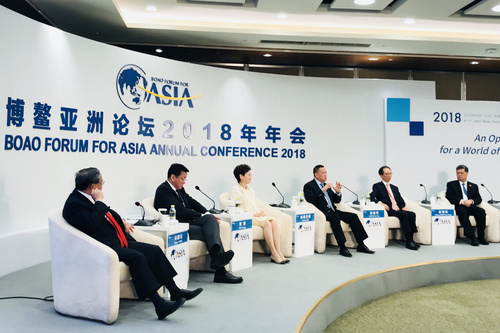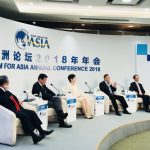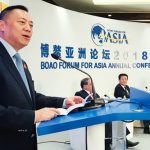 The Secretary for Economy and Finance, Mr Leong Vai Tac, attends the Guangdong-Hong Kong-Macao Greater Bay Area session at the Boao Forum for Asia Annual Conference 2018 held in Hainan Province.
The Secretary for Economy and Finance, Mr Leong Vai Tac, attends the Guangdong-Hong Kong-Macao Greater Bay Area session at the Boao Forum for Asia Annual Conference 2018 held in Hainan Province.
The Guangdong-Hong Kong-Macao Greater Bay Area is to create further opportunities for Macao to advance ties with regional partners, to integrate itself with national development, and to achieve long-term stability and prosperity.
The Secretary for Economy and Finance, Mr Leong Vai Tac, shared his thoughts today during the Guangdong-Hong Kong-Macao Greater Bay Area session at the Boao Forum for Asia Annual Conference 2018, held in Hainan Province.
Others attending the session included: the Chief Executive of the Hong Kong Special Administrative Region (SAR), Mrs Carrie Lam Cheng Yuet-ngor; and the Governor of Guangdong Province, Mr Ma Xingrui.
In his speech, Mr Leong pointed out that the Chief Executive of the Macao SAR, Mr Chui Sai On, attached great importance to Macao’s participation in the Greater Bay Area project; Mr Chui himself led the Government’s coordination efforts in this matter.
Macao’s contribution to the Greater Bay Area would adhere to the principle of “serving the country’s needs, delivering Macao’s strengths”, stressed Mr Leong.
It would also make use of the city’s strategic position, as respectively, a world centre of tourism and leisure, and a commercial and trade cooperationservice platform between China and Portuguese-speaking countries (collectively known as the “Centre and Platform” policies), while pursuing goals outlined in the “Framework Agreement on Deepening Guangdong-Hong Kong-Macao Cooperation in the Development of the Bay Area”.
During the Forum session, Mr Leong stated an initiative such as this, which covered a cluster of 11 metropolitan areas, required an innovative model of cooperation, in order to address issues relating to the circumstances of “one country, two systems, three separate customs territories”.
Mr Leong said in his address that Macao would capitalise on its advantages in making its contribution to the development of the Greater Bay Area. One such advantage was Macao’s strong network of overseas Chinese, particularly in terms of their links with either the mainland, Portuguese-speaking countries, European countries other than Portugal, or member states of the Association of Southeast Asian Nations. These ties were significantly conducive to assisting businesses in the Greater Bay Area to attract worldwide investment, and for the process of “going global”.
Guangdong-Macao cooperation would be another example of the city’s effort in the Greater Bay Area. The two sides had completed discussions on the establishment of a 20-billion-renminbi investment fund for cooperation; the Government was looking forward to the signing of relevant agreements in order to initiate such cooperation, stated Mr Leong.
Regarding traditional Chinese medicine (TCM), the Government would make further efforts in order to help qualified TCM enterprises and products to reach – using Macao as a platform – markets such as those in either Portuguese-speaking countries, European countries other than Portugal, or places covered by the “Belt and Road” initiative.
Culturally, Macao would press ahead with establishing itself as a base for multicultural exchanges and cooperation with an emphasis on Chinese culture and on promoting exchanges between the mainland and Portuguese-speaking countries.
The Secretary stressed that the Government would work with other places in the Greater Bay Area, in order to improve facility connectivity and efficiency regarding customs clearance; and to enhance overall social well-being, in order to build a prosperous, harmonious and beautiful city cluster.
View gallery


